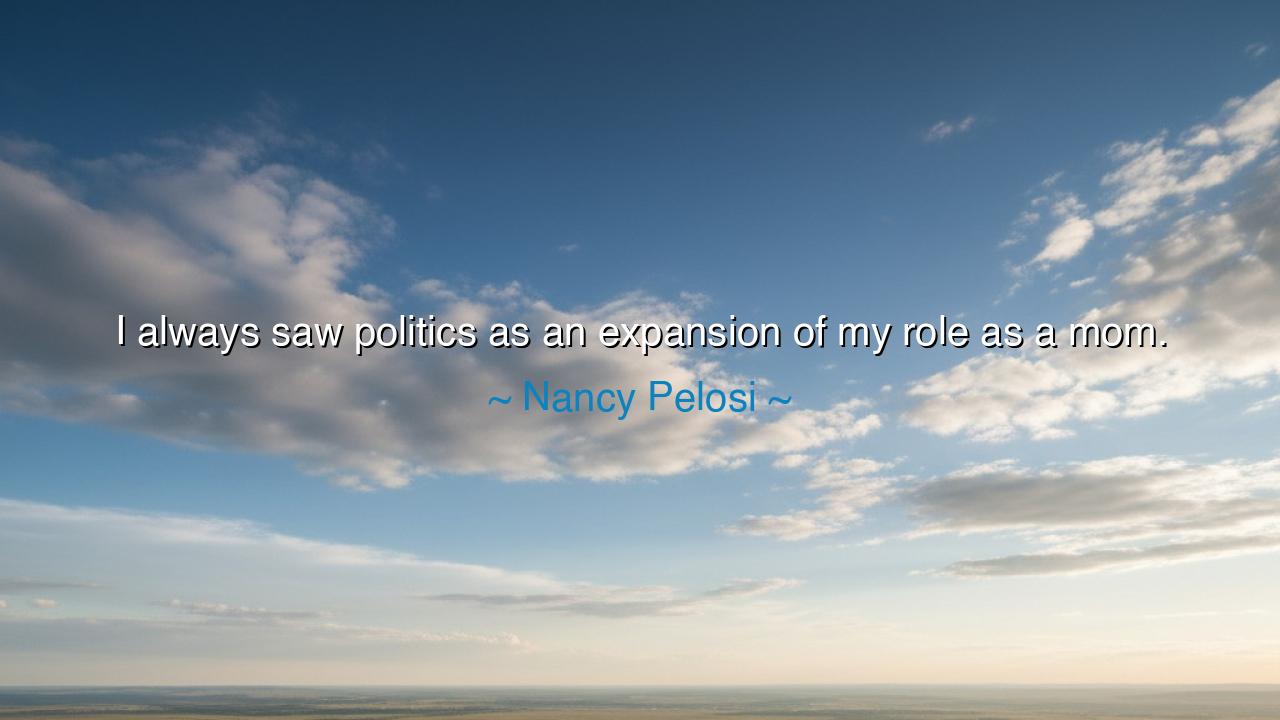
I always saw politics as an expansion of my role as a mom.






“I always saw politics as an expansion of my role as a mom.” — Nancy Pelosi
In these profound and tender words, Nancy Pelosi unveils a truth that bridges the personal and the political, the home and the world. Her declaration, “I always saw politics as an expansion of my role as a mom,” is not merely the reflection of a stateswoman — it is the creed of a mother who saw governance not as ambition, but as care magnified. In her vision, leadership is not domination; it is nurturing on a grander scale. The heart that once beat for her children grew to beat for her nation. The ancients, who revered the union of wisdom and compassion, would have called this the matriarch’s calling — the art of transforming love into law, and the instinct to protect into the courage to lead.
The origin of this truth lies in the essence of motherhood itself, which, since time immemorial, has been the foundation of civilization. A mother is the first ruler of any world — her home — yet she governs not by decree, but by devotion. When Pelosi speaks of politics as an expansion of this sacred role, she is echoing an ancient ideal: that those who lead best are those who have first learned to serve, to sacrifice, and to listen. The mother’s task — to feed, to teach, to heal, to guide — mirrors the responsibilities of a just ruler. For the home is the seed of the republic, and those who master compassion there are prepared to practice it everywhere.
The ancients honored such wisdom in their stories. Consider Cornelia, mother of the Gracchi, in ancient Rome. When other women boasted of jewels, she pointed to her sons and said, “These are my treasures.” Her devotion to their moral and civic education bore fruit in their later reforms for the poor — acts that changed Rome itself. Pelosi’s statement carries that same lineage of thought: that the virtues cultivated in motherhood — patience, empathy, justice — are not confined to the hearth but are forces capable of shaping nations. In this way, the personal becomes political, and love itself becomes a form of governance.
But this idea is not only ancient; it is also deeply human. For in the chaos of public life, where ambition and ego often clash, the leader who remembers the heart of a mother leads with a different hand. Pelosi, through decades of service, approached her work as a continuation of her family’s moral compass — defending the vulnerable, uplifting the forgotten, and building systems of support rather than towers of pride. Her motherhood was not set aside for politics; it became the soul of it. The ancients would call this arete, the excellence of character that bridges private virtue and public action.
Her words also contain a message of humility and empowerment. To see motherhood as preparation for leadership is to elevate what society too often overlooks. For centuries, the labors of women within the home were dismissed as lesser, though they were the very labors that sustained the world. Pelosi’s quote restores their sacredness. It tells us that every meal prepared, every child guided, every act of quiet strength within the walls of a home is training for greatness. The ancients taught that the smallest acts, done with devotion, ripple into eternity. Likewise, Pelosi’s philosophy teaches that service to the few prepares one for service to the many.
Consider also the story of Eleanor Roosevelt, who began as a mother and became a champion of human rights. When tragedy struck and her world collapsed, she transformed grief into action, carrying her maternal compassion into the halls of power. Like Pelosi, she saw no difference between the love that nurtures a child and the love that seeks justice. The ancients might have called her a priestess of humanity — one who turns private sorrow into public strength. Such women remind us that the greatest leaders are often those who begin not with ambition, but with empathy.
And so, the lesson is clear and timeless: lead as a parent leads — with wisdom, with care, and with courage. Whether your realm is a home, a classroom, a workplace, or a nation, remember that leadership is an act of guardianship. Nurture those in your charge, but do not shield them from growth. Guide with patience, correct with love, and never mistake authority for superiority. For as Nancy Pelosi reminds us, true leadership is an extension of compassion — and compassion, when magnified, becomes the heartbeat of justice.
Let this wisdom echo through generations: power that is not rooted in care becomes tyranny, but power guided by the heart of a mother becomes stewardship. The ancients knew this; the wise of every age rediscover it. To lead as a mother leads is to build, to protect, and to love — not with sentiment, but with steadfastness. And when such love governs the world, the world itself begins to heal.






AAdministratorAdministrator
Welcome, honored guests. Please leave a comment, we will respond soon